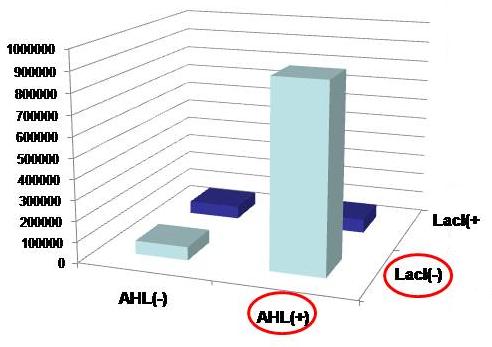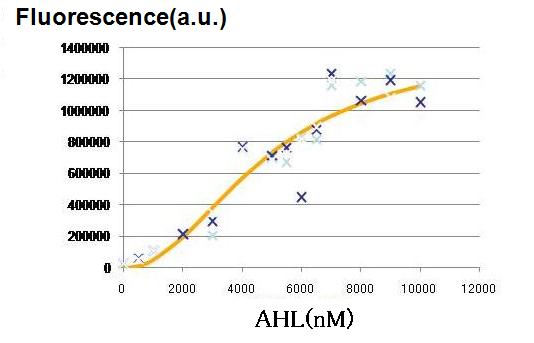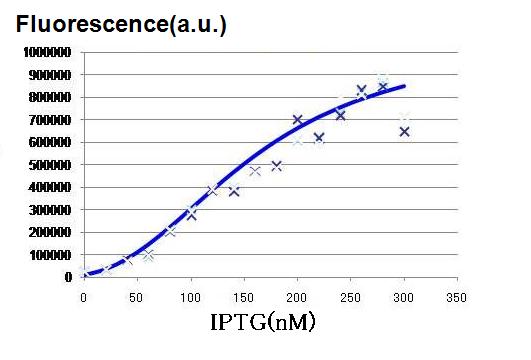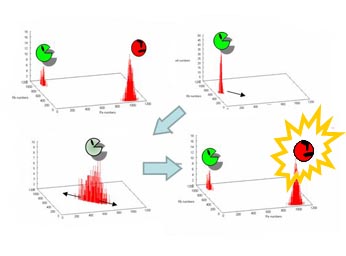Tokyo/Works
From 2007.igem.org
(→2.<span style="color:#ff33cc;">Wet </span>: Assay1 using "Externally added" materials) |
|||
| Line 20: | Line 20: | ||
We have created a new hybrid promoter and did its functional check. ('''Fig. 1''' and '''2''') | We have created a new hybrid promoter and did its functional check. ('''Fig. 1''' and '''2''') | ||
This newly devised hybrid promoter regulated by two inputs is essential to the genetic circuit in our project. | This newly devised hybrid promoter regulated by two inputs is essential to the genetic circuit in our project. | ||
| - | Since there are no parts available that meet required conditions - activated by AHL and repressed by LacI - among previous publishments as well as BioBrick parts, we started with the design of its sequence. | + | Since there are no parts available that meet required conditions - activated by AHL and repressed by LacI - among previous publishments as well as BioBrick parts, we started with the design of its sequence. '''([[Tokyo/Works/Hybrid promoter|See more.]])''' |
<br>[[Image:Hybridgraph.JPG|thumb|200px|'''Fig. 1 New Hybrid Promoter''' The newly deviced hybrid promoter is regulated by two inputs, AHL and LacI.|left]][[Image:Hybridpromoter.JPG|thumb|500px|'''Fig. 2 The sequence of the hybrid promoter''' <br> The sequence contains regulatory sites of AHL-LuxR, LacI.|center|left]] | <br>[[Image:Hybridgraph.JPG|thumb|200px|'''Fig. 1 New Hybrid Promoter''' The newly deviced hybrid promoter is regulated by two inputs, AHL and LacI.|left]][[Image:Hybridpromoter.JPG|thumb|500px|'''Fig. 2 The sequence of the hybrid promoter''' <br> The sequence contains regulatory sites of AHL-LuxR, LacI.|center|left]] | ||
<br><br><br> | <br><br><br> | ||
| Line 36: | Line 36: | ||
'''Second, we tired to mathmatically express our model.''' | '''Second, we tired to mathmatically express our model.''' | ||
| - | <br>From simple equations, the equations necessary for our model have been deviated step by step. In the final step a stochastic differential equation is used.([[Tokyo/Works/Formulation |See more.]]) | + | <br>From simple equations, the equations necessary for our model have been deviated step by step. In the final step a stochastic differential equation is used.'''([[Tokyo/Works/Formulation |See more.]])''' |
<br>[[Image:Expression5-1.jpg|400px]] | <br>[[Image:Expression5-1.jpg|400px]] | ||
<!--リプレッサーA,B,シグナル分子Sの時間変化を式として表し、安定性解析を行った結果、Hill係数が大切であることがわかった | <!--リプレッサーA,B,シグナル分子Sの時間変化を式として表し、安定性解析を行った結果、Hill係数が大切であることがわかった | ||
| Line 59: | Line 59: | ||
<!--2.wet実験で求められた値を用いて解析を行った。集団が怠け者の細胞のみとなった場合に、一度不安定化し、続いて働き者と怠け者になることをStocastic Simulationで確認した。このシステムの挙動に必要な他のパラメータ範囲が判明した。--> | <!--2.wet実験で求められた値を用いて解析を行った。集団が怠け者の細胞のみとなった場合に、一度不安定化し、続いて働き者と怠け者になることをStocastic Simulationで確認した。このシステムの挙動に必要な他のパラメータ範囲が判明した。--> | ||
'''Using the data from actual experiments, we simulated behaviors of our model.''' | '''Using the data from actual experiments, we simulated behaviors of our model.''' | ||
| - | <br>Based on stochastic simulation using parameters obtained from our wet experiments, we have confirmed that the whole system becomes unstable when there are only idlers left, and then, they become either of workers and idlers. Also we have determined other parameters necessary for the desired behavior of this system. ([[Tokyo/Works/Simulation |See more.]]) | + | <br>Based on stochastic simulation using parameters obtained from our wet experiments, we have confirmed that the whole system becomes unstable when there are only idlers left, and then, they become either of workers and idlers. Also we have determined other parameters necessary for the desired behavior of this system. '''([[Tokyo/Works/Simulation |See more.]])''' |
<!--最終日に動画と差し替え??--> | <!--最終日に動画と差し替え??--> | ||
| Line 74: | Line 74: | ||
今後、ここから示唆されることを行うこととする。--> | 今後、ここから示唆されることを行うこととする。--> | ||
'''Here the simulation results were tested by actual wet experiments.''' | '''Here the simulation results were tested by actual wet experiments.''' | ||
| - | <br>Whether the parameters obtained in 3 is feasible in actual Wet experiments was tested by focusing on the amount of cell-produced AHL as well as the strength of the promoters. Indication from the result is applied for the next work.([[Tokyo/Works/Assay2 |See more.]]) | + | <br>Whether the parameters obtained in 3 is feasible in actual Wet experiments was tested by focusing on the amount of cell-produced AHL as well as the strength of the promoters. Indication from the result is applied for the next work.'''([[Tokyo/Works/Assay2 |See more.]])''' |
<!--Simulationを満たすための他のパラメータが現在のプラスミドで可能であるかを、大腸菌を用いた実験で確認した。 | <!--Simulationを満たすための他のパラメータが現在のプラスミドで可能であるかを、大腸菌を用いた実験で確認した。 | ||
<br>By the wet experiments using ''E. coli'', we testified whether our current plasmids can satisfy the other required conditions (for the desired behavior of the system) estimated by the simulation.--> | <br>By the wet experiments using ''E. coli'', we testified whether our current plasmids can satisfy the other required conditions (for the desired behavior of the system) estimated by the simulation.--> | ||
| Line 83: | Line 83: | ||
このように、ある遺伝子回路をシミュレーションを行いながらつくっていくと交換というこ必要性が増してくると思われる。そこで、我々は交換のために有用な手段を提案する。(⇒アダプター)--> | このように、ある遺伝子回路をシミュレーションを行いながらつくっていくと交換というこ必要性が増してくると思われる。そこで、我々は交換のために有用な手段を提案する。(⇒アダプター)--> | ||
Through the experiments mentioned above, we have found that our model can be completed by changing some of the parts employed so far. Continuing such simulation oriented construction of genetic circuit, it will be increasingly necessary to exchange parts. Here we would like to offer useful means for part exchanges. | Through the experiments mentioned above, we have found that our model can be completed by changing some of the parts employed so far. Continuing such simulation oriented construction of genetic circuit, it will be increasingly necessary to exchange parts. Here we would like to offer useful means for part exchanges. | ||
| - | <br><br>'''Based on the results from wet experiments, the next dry approach - analysis and simulation - should be performed, which will in turn be testified and confirmed by wet experiments. Continueing these processes, if time permits, would further sophisticate and complete our model. '''([[Tokyo/Works/Future works |See more.]]) | + | <br><br>'''Based on the results from wet experiments, the next dry approach - analysis and simulation - should be performed, which will in turn be testified and confirmed by wet experiments. Continueing these processes, if time permits, would further sophisticate and complete our model. '''([[Tokyo/Works/Future works |See more.]])''' |
Revision as of 15:00, 25 October 2007
Abstract Concept & Model Requirements Genetic_circuit Works About_our_team
0. Hybrid promoter 1. Formulation 2. Assay1 3. Simulation 4. Assay2 5. Future works
以下Worksのアブストとなる文章に。上下との話のつながりも明記。
How to reach our goal
We have alternatly implemented Wet and Dry experiments to achieve our goal
Our purpose is the construction and development of genetic circuit to establish "coexistence stability" model. We have alternately employed Dry and Wet approaches. We have drew a navigational chart on our project, which has been confirmed and reinforced by the data from Wet approaches.
0. Wet : Hybrid promoter
First, the newly devised promoter sensed the Two inputs is necessary for the Genetic_circuit.
We have created a new hybrid promoter and did its functional check. (Fig. 1 and 2) This newly devised hybrid promoter regulated by two inputs is essential to the genetic circuit in our project. Since there are no parts available that meet required conditions - activated by AHL and repressed by LacI - among previous publishments as well as BioBrick parts, we started with the design of its sequence. (See more.)
1.Dry : Formulation
Second, we tired to mathmatically express our model.
From simple equations, the equations necessary for our model have been deviated step by step. In the final step a stochastic differential equation is used.(See more.)
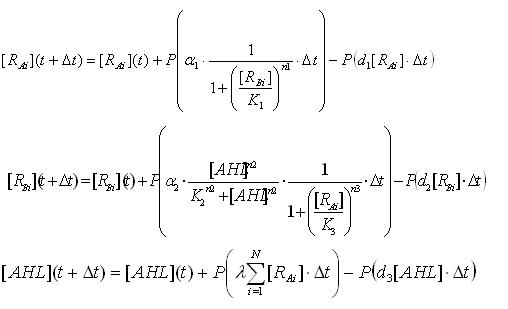
2.Wet : Assay1 using "Externally added" materials
To determine the parameters of Hill coefficients, AHL and IPTG assays were conducted.
Fig. 3 and 4 shows some results of these assays.
(See more.)
3.Dry : Simulation
Using the data from actual experiments, we simulated behaviors of our model.
Based on stochastic simulation using parameters obtained from our wet experiments, we have confirmed that the whole system becomes unstable when there are only idlers left, and then, they become either of workers and idlers. Also we have determined other parameters necessary for the desired behavior of this system. (See more.)
4.Wet : Assay2 on "Cell-produced" AHL and Expression comparison
Here the simulation results were tested by actual wet experiments.
Whether the parameters obtained in 3 is feasible in actual Wet experiments was tested by focusing on the amount of cell-produced AHL as well as the strength of the promoters. Indication from the result is applied for the next work.(See more.)
5.Future works
Through the experiments mentioned above, we have found that our model can be completed by changing some of the parts employed so far. Continuing such simulation oriented construction of genetic circuit, it will be increasingly necessary to exchange parts. Here we would like to offer useful means for part exchanges.
Based on the results from wet experiments, the next dry approach - analysis and simulation - should be performed, which will in turn be testified and confirmed by wet experiments. Continueing these processes, if time permits, would further sophisticate and complete our model. (See more.)
